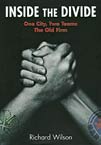 One city, two teams…
the Old Firm
One city, two teams…
the Old Firm
by Richard Wilson
Canongate, £16.99
Reviewed by Graham McColl
From WSC 301 March 2012
Robust, solid and relentlessly serious, this foursquare introduction to the Old Firm reflects the grim nature of the ongoing struggle for temporary footballing supremacy in Glasgow that obsesses the followers of both clubs. It is almost flawless factually, although many of its tales will be as familiar to Scottish football supporters as their own front door and there appears to be only one fresh interview with a manager or player who has tasted the rivalry.
Strangely, the individual in question turns out to be Harald Brattbakk, a Norwegian accountant who turned professional and spent a couple of ill-starred years at Celtic. For other contributions from the fixture's closest participants, the author relies on the ancient craft of cutting and pasting. Had he followed his instincts and probed just a little bit more, the first true classic work on the Old Firm could have been within his grasp.
The writing is excellent but – like many of the tense contests between these two behemoths, in which flashes of stylish football only occasionally intrude – the author rations his ability to dispense his near-literary segments of quality. Of the Glasgow gallows humour he writes reflectively: "The dry, black wit shapes the opportunism of the addict and the criminal as much as the lawyer and the doctor. Even the River Clyde, which runs along the edge of the city centre in a deep, slow weave, often looks grey and surly, as if reflecting still the great shipbuilding clamour of the past."
Mason captures well the intolerant atmosphere, as in his description of Celtic fans ritualistically waiting for the Rangers coach to arrive at Celtic Park before the match: "‘There's the bus. There they are. Dirty Orange bastards.' The coach carrying the Rangers team drives by, flanked by police motorcycles. ‘I hope they've paid their fare,' shouts another voice. Shadowed faces can be seen behind the darkened glass, watching. More voices rise now, loud, fierce, defiant. ‘Cel-tic. Cel-tic. Cel-tic.'"
The chapter on refereeing the Old Firm is an unfortunate standout, in that it uses almost solely the evidence of Hugh Dallas, who in late 2010 left his post as head of referee development at the Scottish Football Association, after he had reportedly forwarded an email relating to the Pope and paedophilia. Strange that his testimony should be offered as valid, given the religious friction that scars the rivalry.
There are also some notable omissions, such as a look at how, rather than being divided, the Old Firm are probably more closely entwined than any two other clubs worldwide. Or an analysis of their long-running non-aggression pact, which enables them to block any move by the SPL and other clubs that might threaten their financial hegemony. Or how the rivalry allows the people who run the clubs to get away with almost anything, often in tandem: including each placing rookie managers in charge of these massive clubs because Ally McCoist and Neil Lennon seemingly fit the right profile for many supporters. Experience? Success in Europe? Who needs it when you can be called a great manager overnight thanks to a lucky break or two in an Old Firm match.